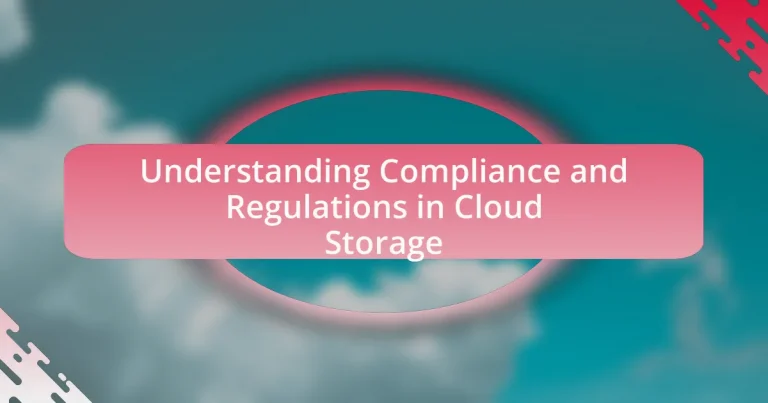Compliance and regulation in cloud storage involves adhering to laws and standards that govern data management and protection, such as GDPR and HIPAA. This article outlines the importance of compliance in safeguarding sensitive information, mitigating risks of data breaches, and avoiding legal penalties. It discusses key regulations affecting cloud storage, the potential risks of non-compliance, and best practices organizations can adopt to ensure adherence. Additionally, the article highlights the challenges of maintaining compliance, the role of technology in facilitating compliance efforts, and future trends in data protection regulations.
What is Compliance and Regulation in Cloud Storage?
Compliance and regulation in cloud storage refers to the adherence to laws, standards, and guidelines that govern the management and protection of data stored in cloud environments. Organizations must comply with various regulations such as the General Data Protection Regulation (GDPR) in Europe, which mandates strict data protection measures, and the Health Insurance Portability and Accountability Act (HIPAA) in the United States, which sets standards for protecting sensitive patient information. These regulations require cloud service providers and their clients to implement specific security controls, conduct regular audits, and ensure data privacy to mitigate risks associated with data breaches and non-compliance penalties.
Why is Compliance Important in Cloud Storage?
Compliance is important in cloud storage because it ensures that organizations adhere to legal, regulatory, and industry standards regarding data protection and privacy. Adhering to compliance frameworks, such as GDPR or HIPAA, helps mitigate risks associated with data breaches and legal penalties. For instance, non-compliance can result in fines that can reach millions of dollars, as seen in cases where companies failed to protect sensitive customer data. Therefore, maintaining compliance not only safeguards sensitive information but also builds trust with customers and stakeholders, ultimately supporting business continuity and reputation.
What are the potential risks of non-compliance in cloud storage?
The potential risks of non-compliance in cloud storage include legal penalties, data breaches, and reputational damage. Legal penalties can arise from failing to adhere to regulations such as GDPR or HIPAA, which may result in fines that can reach millions of dollars. Data breaches often occur when compliance measures are not followed, leading to unauthorized access to sensitive information, which can compromise customer trust and lead to further financial losses. Reputational damage can significantly impact a business’s standing in the market, as customers are increasingly concerned about how their data is handled. According to a study by IBM, the average cost of a data breach in 2021 was $4.24 million, highlighting the financial implications of non-compliance.
How can compliance enhance data security in cloud storage?
Compliance enhances data security in cloud storage by ensuring that organizations adhere to established regulations and standards that govern data protection. These regulations, such as GDPR, HIPAA, and PCI DSS, mandate specific security measures, including encryption, access controls, and regular audits, which collectively mitigate risks of data breaches and unauthorized access. For instance, a study by the Ponemon Institute found that organizations with compliance programs in place experienced 50% fewer data breaches compared to those without. This demonstrates that compliance not only enforces best practices but also fosters a culture of accountability and vigilance regarding data security.
What are the Key Regulations Governing Cloud Storage?
The key regulations governing cloud storage include the General Data Protection Regulation (GDPR), the Health Insurance Portability and Accountability Act (HIPAA), and the Federal Risk and Authorization Management Program (FedRAMP). GDPR mandates strict data protection and privacy standards for personal data of EU citizens, requiring organizations to implement robust security measures and obtain explicit consent for data processing. HIPAA establishes requirements for safeguarding sensitive patient information in the healthcare sector, ensuring that cloud service providers comply with privacy and security rules. FedRAMP provides a standardized approach to security assessment, authorization, and continuous monitoring for cloud services used by federal agencies, ensuring that these services meet specific security requirements. These regulations collectively shape the compliance landscape for cloud storage, emphasizing the importance of data protection and security across various sectors.
What is the General Data Protection Regulation (GDPR) and its impact on cloud storage?
The General Data Protection Regulation (GDPR) is a comprehensive data protection law enacted by the European Union in May 2018, aimed at enhancing individuals’ control over their personal data. Its impact on cloud storage is significant, as it mandates that organizations storing personal data in the cloud must ensure compliance with strict data protection principles, including obtaining explicit consent from users, ensuring data portability, and implementing robust security measures to protect data from breaches. Non-compliance can result in substantial fines, up to 4% of annual global turnover or €20 million, whichever is higher, thereby compelling cloud service providers and their clients to adopt stringent data governance practices.
How does the Health Insurance Portability and Accountability Act (HIPAA) affect cloud storage for healthcare data?
The Health Insurance Portability and Accountability Act (HIPAA) mandates that cloud storage providers handling healthcare data must implement strict security measures to protect patient information. HIPAA requires covered entities and business associates to ensure the confidentiality, integrity, and availability of electronic protected health information (ePHI). This includes conducting risk assessments, implementing access controls, and ensuring data encryption both in transit and at rest. Additionally, cloud service providers must sign Business Associate Agreements (BAAs) to confirm their compliance with HIPAA regulations, thereby holding them accountable for any breaches or violations. Failure to comply with HIPAA can result in significant fines and legal repercussions for both the healthcare organization and the cloud provider.
What are the Challenges of Maintaining Compliance in Cloud Storage?
Maintaining compliance in cloud storage presents several challenges, including data security, regulatory complexity, and vendor management. Data security is critical as organizations must ensure that sensitive information is protected against breaches, which can lead to non-compliance with regulations such as GDPR or HIPAA. Regulatory complexity arises from the need to navigate various laws and standards that differ by region and industry, making it difficult for organizations to implement uniform compliance strategies. Additionally, vendor management poses a challenge, as organizations must ensure that third-party cloud service providers adhere to compliance requirements, which can be difficult to monitor and enforce. These challenges highlight the intricate landscape of compliance in cloud storage, necessitating robust strategies and continuous oversight.
What are the common compliance pitfalls organizations face in cloud storage?
Organizations commonly face several compliance pitfalls in cloud storage, including inadequate data protection measures, lack of visibility into data location, and failure to comply with industry-specific regulations. Inadequate data protection can lead to unauthorized access and data breaches, which violate regulations like GDPR and HIPAA. Lack of visibility into where data is stored can result in non-compliance with data residency laws, as organizations may inadvertently store sensitive data in jurisdictions with stricter regulations. Additionally, failure to regularly audit and assess cloud service providers can lead to gaps in compliance, as organizations may not be aware of the security practices and policies of their providers. These pitfalls highlight the importance of implementing robust compliance frameworks and conducting regular assessments to ensure adherence to relevant regulations.
How can organizations effectively manage compliance audits in cloud storage?
Organizations can effectively manage compliance audits in cloud storage by implementing a structured framework that includes regular assessments, clear documentation, and automated monitoring tools. This approach ensures that all data stored in the cloud adheres to relevant regulations such as GDPR or HIPAA. Regular assessments help identify compliance gaps, while clear documentation provides an audit trail that demonstrates adherence to policies. Automated monitoring tools can continuously track compliance status and alert organizations to potential issues, thereby facilitating timely corrective actions. This method is supported by the fact that organizations utilizing automated compliance solutions report a 50% reduction in audit preparation time, according to a study by the Ponemon Institute.
How do Organizations Ensure Compliance in Cloud Storage?
Organizations ensure compliance in cloud storage by implementing a combination of regulatory frameworks, data governance policies, and security measures. They adopt standards such as GDPR, HIPAA, and ISO 27001 to guide their compliance efforts, ensuring that data handling practices meet legal requirements. Additionally, organizations conduct regular audits and assessments to evaluate their compliance status and identify areas for improvement. They also utilize encryption, access controls, and monitoring tools to protect sensitive data and maintain compliance with industry regulations. These practices are essential for mitigating risks associated with data breaches and ensuring that organizations adhere to legal obligations.
What best practices should organizations follow for compliance in cloud storage?
Organizations should implement data encryption, access controls, and regular audits to ensure compliance in cloud storage. Data encryption protects sensitive information both at rest and in transit, making it unreadable to unauthorized users. Access controls limit who can view or modify data, ensuring that only authorized personnel have access to sensitive information. Regular audits help organizations assess their compliance with relevant regulations, such as GDPR or HIPAA, and identify any potential vulnerabilities or areas for improvement. These practices collectively enhance security and ensure adherence to legal and regulatory requirements.
How can technology assist in maintaining compliance in cloud storage?
Technology assists in maintaining compliance in cloud storage by implementing automated monitoring and reporting tools that ensure adherence to regulatory standards. These tools continuously track data access, usage, and storage practices, providing real-time alerts for any compliance breaches. For instance, cloud service providers often integrate encryption and access controls to protect sensitive data, aligning with regulations such as GDPR and HIPAA. Additionally, compliance management software can generate audit trails and compliance reports, facilitating easier assessments and audits, which are essential for meeting legal requirements.
What are the Future Trends in Compliance and Regulations for Cloud Storage?
Future trends in compliance and regulations for cloud storage include increased data sovereignty requirements, enhanced privacy regulations, and the adoption of standardized compliance frameworks. Data sovereignty mandates that data be stored and processed within specific geographic boundaries, leading to stricter regulations in various jurisdictions. Enhanced privacy regulations, such as the General Data Protection Regulation (GDPR) in Europe, are influencing global standards for data protection and user consent. Additionally, organizations are increasingly adopting standardized compliance frameworks, such as ISO 27001, to streamline their compliance efforts and ensure adherence to best practices. These trends reflect a growing emphasis on data security, user privacy, and regulatory alignment in the cloud storage landscape.
How are emerging technologies influencing compliance in cloud storage?
Emerging technologies are significantly influencing compliance in cloud storage by enhancing data security, automating compliance processes, and enabling real-time monitoring. For instance, advancements in artificial intelligence and machine learning allow organizations to analyze vast amounts of data for compliance risks more efficiently, reducing human error and improving accuracy. Additionally, blockchain technology provides immutable records of transactions, which can help in maintaining compliance with regulations such as GDPR and HIPAA by ensuring data integrity and traceability. According to a report by Gartner, organizations that leverage these technologies can reduce compliance costs by up to 30%, demonstrating their effectiveness in streamlining compliance efforts in cloud environments.
What changes can we expect in regulations affecting cloud storage in the coming years?
In the coming years, we can expect stricter regulations affecting cloud storage, particularly regarding data privacy and security. Governments worldwide are increasingly focusing on enhancing data protection laws, as evidenced by the implementation of the General Data Protection Regulation (GDPR) in Europe and similar frameworks emerging in other regions. These regulations will likely mandate more robust data handling practices, including stricter consent requirements, data breach notifications, and enhanced rights for individuals regarding their personal data. Additionally, compliance with international standards such as ISO/IEC 27001 will become more prevalent, as organizations seek to demonstrate their commitment to data security and privacy.
What Practical Steps Can Organizations Take to Achieve Compliance in Cloud Storage?
Organizations can achieve compliance in cloud storage by implementing a comprehensive compliance framework that includes data classification, risk assessment, and regular audits. First, organizations should classify their data to understand which regulations apply, such as GDPR or HIPAA, based on the sensitivity of the information stored. Next, conducting a risk assessment helps identify vulnerabilities and compliance gaps in the cloud environment. Regular audits, both internal and external, ensure ongoing adherence to compliance requirements and help organizations stay updated with evolving regulations. Additionally, organizations should establish clear data governance policies and provide training for employees on compliance best practices. These steps collectively enhance compliance and mitigate risks associated with cloud storage.


